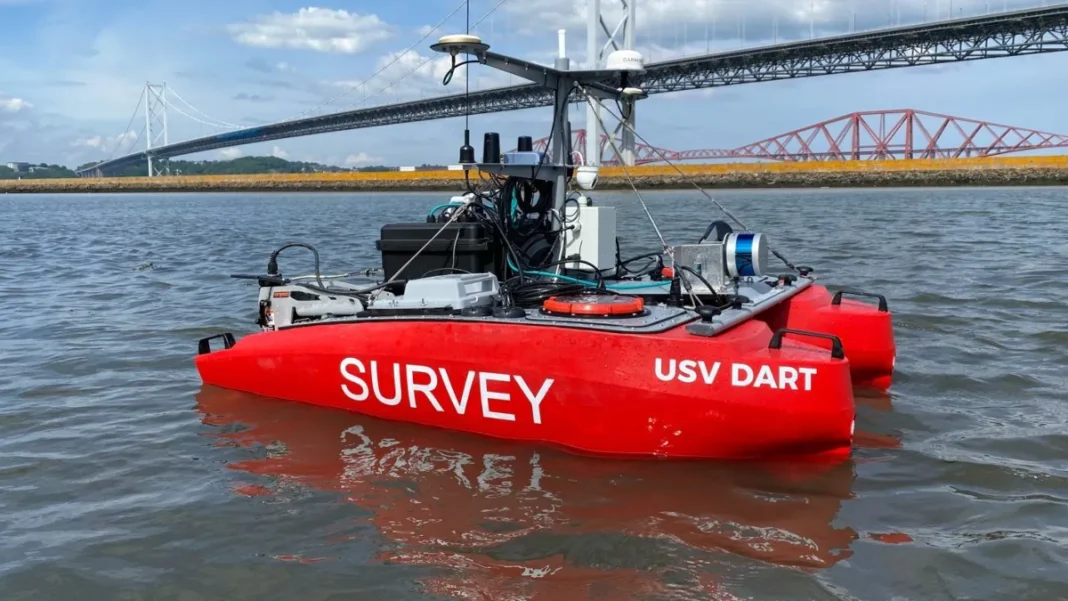BMT is collaborating on a decarbonisation project for the UK’s maritime sector. In partnership with South Devon College and HydroSurv, BMT aims to drive clean and sustainable maritime innovation in the UK’s Southwest and beyond.
This business-led consortium will focus on a cutting-edge, uncrewed vessel technology project in Devon. Dubbed “ROC + DOCK”, the project will see Hydrosurv develop advanced, automated docking stations for the wireless deployment, recovery, and charging of zero-emission Uncrewed Surface Vessels (USVs).
At the same time, South Devon College and BMT, a specialist in maritime autonomous systems and technology, will work together to expand the college’s new BMT REMBRANDT ship simulator into a cutting-edge, dual-use Remote Operations Centre (ROC) facility, enabling the advancement of skills, course development, and operator training provision. This collaboration aims to improve not only simulator-based training but also the safety and operational effectiveness of live remote and uncrewed operations.
This collaboration has been made possible as a result of £440,000 funding from Innovate UK through the Marine and Maritime in the Great Southwest Launchpad programme. The Launchpad programme supports outstanding maritime innovation projects led by businesses that will contribute to the Great South West’s ambitions for net zero targets and support key regional strategic marine and maritime markets.
Innovate UK assessors’ commented on the region’s shortlisted bid: “The maritime innovation project is from a well-thought-out group of companies, it has clear objectives, it builds on both existing facilities and products and also existing markets, and it is well aligned with government aspiration for the development of high technology marine autonomy in the UK.”
The renewable solar energy-powered docking stations will enhance maritime operations by eliminating the need for manual vessel handling and significantly reducing carbon emissions, thereby increasing persistence and availability.
David Hull, CEO of Hydrosurv said: “The project directly addresses the UK’s vision for clean maritime practices as set out within the government’s Maritime 2050 strategy. As the maritime sector evolves, demand for persistent coastal coverage for patrol, surveillance, monitoring, and emergency response increases. Marine robotics has revolutionised data collection over the past decade and USVs, which provide persistent high-frequency, wide spatial data collection in real-time, offer massive disruptive potential to strip out both carbon emissions and cost from these operations.”
Paul Singer, Business & Qualification Development Coordinator at South Devon College said: “Enhancing BMT’s REMBRANDT vessel simulation suite with the new ROC simulation capability will use precision synthetic modelling to deliver step changes in realism and situational awareness. These advancements allow us to provide cutting-edge skills and training to aspiring students embarking on their careers and offer upskilling opportunities for the current workforce. The ROC facility will provide students with a 360-degree view offering a fantastic and unique, real-life-like environment. It means they will be able to practice realistic scenarios, such as incidents at sea, learn how to deal with different weather conditions and remotely operate a vessel in a safe environment.”
Students will be able to replay real-life incidents and work through different ‘what if’ scenarios before moving on to operating a real USV remotely.
Dr. Phil Thompson, Head of Commercial Product Development at BMT, said: “The ROC + DOCK project marks an important step for the maritime sector, introducing our company’s flagship navigation technology, BMT REMBRANDT, into a pivotal collaboration with South Devon College and HydroSurv Uncrewed Survey. This initiative will establish new benchmarks for maritime operations through cutting-edge automated docking stations and a sophisticated Remote Operations Centre (ROC). This collaboration seamlessly merges advanced technologies with practical training solutions, aligning with the UK’s goals for high-tech marine autonomy and contributing to the Maritime 2050 strategy.”
“More recently, we were thrilled to attend the Maritime UK Awards 2024 in Belfast this month and celebrate our recognition for the ROC + DOCK project. Our collaboration with South Devon College and HydroSurv on this innovative project is a testament to the power of teamwork in advancing maritime technology and immersive training. This partnership not only aligns with the UK’s Maritime 2050 strategy but also sets new benchmarks for uncrewed surface vessel systems and remote operations, paving the way for a sustainable and future-ready maritime sector.
Our collaboration on this project further augments the College’s Marine Academy positioning in maritime autonomy, emerging technologies, and decarbonisation, and as the ideal site to develop our expanding sector’s workforce skills of the future.” added Thompson.
Will Alexander, Campaign Lead for Maritime Autonomous Systems at BMT, said: “This collaborative maritime innovation project is a great opportunity to advance the safety, training, and effectiveness of remote and uncrewed operations. It will bring together BMT’s world-class simulation and synthetic modelling software with expertise in training and in the operations and manufacture of uncrewed surface vessels. The integration of BMT’s high-fidelity synthetic environment with the ROC will improve situational awareness, greatly enhancing training and de-risking marine operations. This will help enable greater adoption of maritime uncrewed and autonomous technology, thereby improving the sustainability of the sector as smaller, more efficient uncrewed vessels gradually replace conventional crewed vessels.”
The ROC + DOCK project is not just about technological advancement but also about fostering economic growth and sustainability in the greater Southwest. The initiative promises to create new job opportunities and technological development, positioning the area as a hub of maritime excellence.
“We’re creating a real-world learning environment where advanced technology meets practical, hands-on training,” said Singer. “This exciting new project means that people will be able to learn new skills and have a career in the marine sector where they don’t have to go to sea. It opens up the marine sector to a wider and diverse range of people, and with the plans for Celtic Sea Floating Offshore Wind (FLOW) there will be even more job opportunities available here in the Southwest,” concluded Singer.












